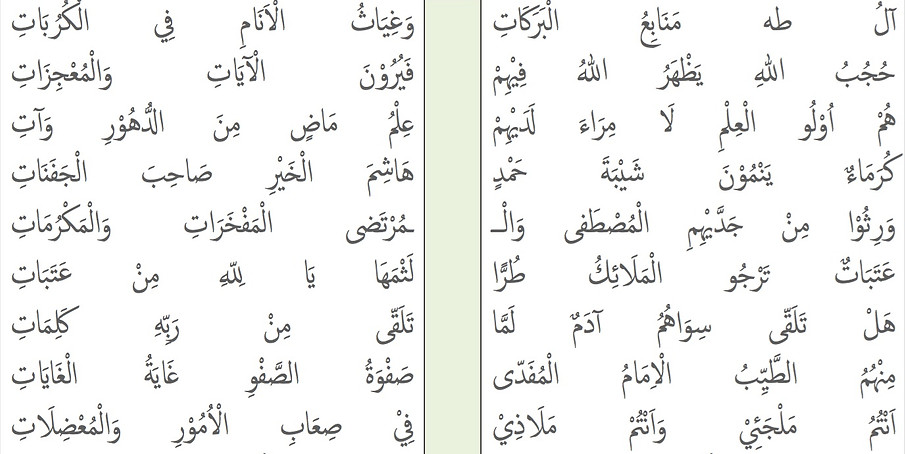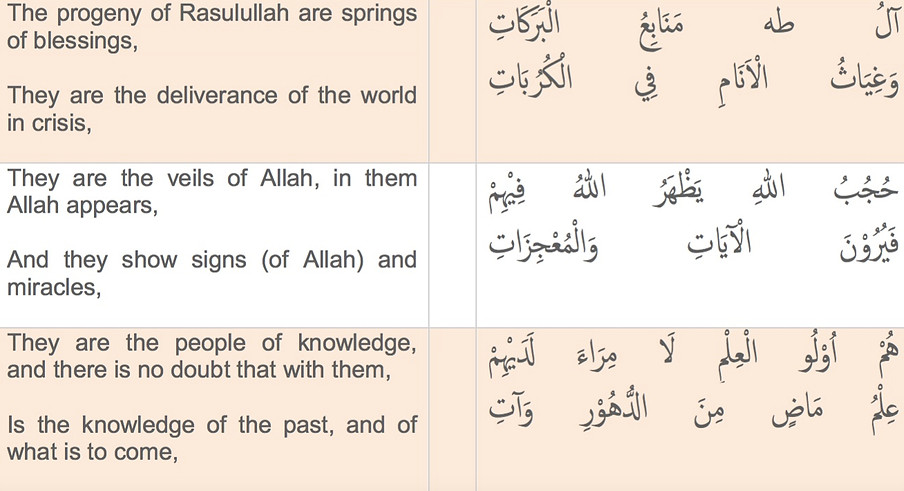آل طْهْ
Aalo Taha
By: Syedna Taher Saifuddin RA
Dawat ni Zaban Khulaso
ائمة فاطميين ني شانات بيشمار ححهسس، ائمة ني ذكر ما قصائد ثثرهواما قراْن مجيد ثثرهوا برابر ثواب ححهسس. سيدنا طاهر سيف الدين ايك قصيدة ما فرماوسس ححهسس، كه قراْن مجيد خدا تع يه ائمة ني مدح ما اُتارا ححهسس. يه قراْن مجيد نا قرناء (ساتهيو) ائمة طاهرين اهني معاني بيان كري سكسس ححهسس
فِيْ مَدْحِكُمْ نُزِّلَ الْقُرْانُ تَنْزِيْلاَ
وَفُصِّلَتْ بِكُمُ الْايَاتُ تَفْصِيْلاَ
سيدنا طاهر سيف الدين اْقا يه دس هزار كرتا زيادة ابيات ائمة طاهرين ني مدح ما تصنيف فرماوي ححهسس، امامو ني شان ما لكهي ؛. اْلُ طْهْ نا قصيدة سيدنا طاهر سيف الدين يه عيد الفطر نا موقع ثثر لكها ؛. ايك وقت بدري محل ما تشريف راكهتا تها. اْثث بيتهك ما سي نيححسس مجلس ما ثثدهارتا تها، انسس اْثثنا ساتهسس جه خدمة ككزار (ديوان) هتا يه عرض كيدي: "مولى اْ ورس نا قصيدة نو سوطط. هجي لكهايا نتهي". ته} وقت اْقا طاهر فرماوسس ؛ كه ميطط كهوطط ححهوطط ته لكهو، انسس امام نا الهام سي اْثث يه اْ شان نا قصيدة جه هميشه هر مجلس ما ثثرهائي ؛ ته ارتجالاً، وهاطط نسس وهاطط تصنيف فرمايا.
اْ قصيدة نا ثثهلا حصه ما اْقا طاهر ائمة ني الْهي شانات ني ذكر كرسس ؛، فرماوسس ؛ كه ائمة طاهرين رسول الله نا فرزندو، بركات نا ححشماؤ ؛. اْثث خدا تع نا ثثرداؤ ؛، جه حجب تهكي خدا معاجز بتاوسس ؛ انسس اْيات ظاهر كرسس ؛. ائمة علم نا صاحبو ؛، مَا كا نَ انسس سَيَكُون نو علم – جه بني ححكو انسس جه بننار ؛ - يه علم ثثر اْككاه ؛. اْثث سككلا نا اْباء (هاشم امام انسس عبد المطلب امام مثل) اْثثني سخاوة مشهورة ؛، انسس اْثثنا نانا نبي انسس دادا علي سي وراثة ما اْثثنسس تمام شانات ملي ؛. اْثثني دهليز ححومبوانسس ملائكة شوق كرسس ؛، انسس اْثث سككلا نا وسيلة سي خدا يه اْدم ني توبة قبول كيدي. امامو ما سي ايك امام طَيِّب ؛، جه خلاصاؤ نا خلاصة ؛.
قصيدة نا بيجا حصه ما ائمة طاهرين ساتهسس اهنا شيعة انسس غلامو نو يه الْهي مقامات ساتهسس سوطط رشتو ؛ انسس بيشمار محبة ؛ اهني ذكر فرماوسس ؛. اْقا طاهر فرماوسس ؛ كه ائمة طاهرين مؤمنين واسطسس مشكل ما اْسرا ؛، سهارا ؛. انسس اْ موالي سي} همنسس جنة انسس نجاة ملنار ؛. ته بعد دعاء كرتا هوا فرماوسس ؛، كه ائمة ني محبة نو وسيلة لئي نسس خدا تع نا نزديك ايم دعاء كرئيسس ؛ كه ائمة نا شيعة ني سيئات حسنات ما بدلائي جائي.
اخير ما علي المرتضى نا فرزندو ائمة طاهرين نسس التجاء كرسس ؛ انسس عرض كرسس ؛، كه تمام دعوة نا دشمنو جه فساد كري رهيا ؛، اهنسس جلدي ثثكرجو. ته بعد دوباره الله نا نزديك دعاء كرسس ؛، كه خدا امامو نا سبب، امامو ني محبة سبب، همارا روزه انسس نماز نسس قبول كرجو. طْهْ انسس اْثثني اْل ائمة ثثر صلوات انسس سلام ثثرهجو.
English Introduction
The qasida of “Aalo Taha” is in madeh or praise of the Aimmat Tahereen, and was composed by Syedna Taher Saifuddin (RA) on the occasion of Eid ul Fitr. That Eid, when Syedna Taher Saifuddin RA was coming down from his bethak room in Badri Mahal for Eid Majlis, his khidmatguzaar did araz to him, that “O Maula, what of this year’s Eid qasida? It has not been written as of yet.” Syedna Taher Saifuddin replied, “Write what I dictate to you.” Then and there, he composed on the spot this most well-known qasida of the Fatemi Dawat.
The shanaat or virtues of the Aimmat Fatemeyeen are countless. Reciting their qasidas of praise gives us the sawaab of reciting the Quran. As Syedna Taher Saifuddin states in another qasida (fi madhekum nuzzila l-Qur’ano tanzeela), it is in praise of Mohammad’s progeny that Allah has revealed the Quran, and it is they who explain its true meaning.
In the first section of the qasida, Syedna Taher Saifuddin does zikar of the ilaahi shanat of the Aimmat Tahereen and says that the Aimmat, who are the progeny of Rasulullah (SA), are the wellsprings of barakaat, and the veils of Allah, through whom Allah’s signs and miracles are revealed. They are the true repositories of knowledge, for God has given them knowledge of past and future events. The Aimmats generosity is famous like their forefathers (like Hashim Imam and Abdul Muttalib Imam) and they have inherited from Nabi Mohammed and Maula Ali all shanaat and virtues. Their shaan is such that the angels vie to kiss their thresholds. They are the ones whose vasila Adam Nabi took when he asked Allah for forgiveness. Among them is the 21st Imam Tayyeb, purest of the pure.
In the second section of the qasida, Syedna Taher Saifuddin does zikar of the sincere and reverent relation that their shia and mohibbeen have with the Aimmat Tahereen. He declares that the Aimmat Tahereen are mumineen’s support when faced with troubled times. They are ones in whom mumineen take refuge in difficulties. Mumineen seek succor from them always, and through them seek salvation. Aqa Taher Saifuddin does doa, by taking the vasila of the walayat and mohabbat of the Aimmat Tahereen, that the misdeeds of the Shia of Aimmat are forgiven and their good deeds are accepted. Syedna Taher Saifuddin asks the Aimmat Tahereen, sons of Maulana Ali to destroy all of Dawat's enemies, spreaders of hatred and corruption. Aqa Taher Saifuddin then asks Allah to accept from mumineen their prayers and their fasting because of the Aimmat and because of our love for them. And he asks Allah to grace Taha Nabi and his radiant progeny with His salawaat blessings.
Arabic Script and Audio


15
Dawat ni Zaban Translation






English Translation






Audio Grid and Key Vocabulary














